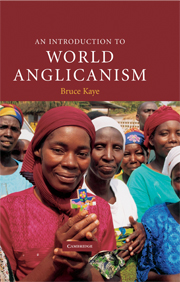Book contents
- Frontmatter
- Contents
- Acknowledgements
- List of abbreviations and sources
- Introduction
- PART I FOUNDATIONS
- PART II THE PRACTICES OF MISSION
- 4 Changing outlooks
- 5 Liturgical formation
- 6 Patterns of engagement – political
- 7 Patterns of engagement – relating to other traditions
- 8 Influence, organisation and power in the church
- 9 Ministerial offices – ordination
- 10 Ministerial offices – ordination of women
- 11 Ministerial offices – homosexuality and the public life of the church
- PART III BELIEFS
- Bibliography
- Index
5 - Liturgical formation
Published online by Cambridge University Press: 05 June 2012
- Frontmatter
- Contents
- Acknowledgements
- List of abbreviations and sources
- Introduction
- PART I FOUNDATIONS
- PART II THE PRACTICES OF MISSION
- 4 Changing outlooks
- 5 Liturgical formation
- 6 Patterns of engagement – political
- 7 Patterns of engagement – relating to other traditions
- 8 Influence, organisation and power in the church
- 9 Ministerial offices – ordination
- 10 Ministerial offices – ordination of women
- 11 Ministerial offices – homosexuality and the public life of the church
- PART III BELIEFS
- Bibliography
- Index
Summary
From the very earliest times Anglicans have been accustomed to ordered prayer and the reading of scripture as part of the church experience. Even when the liturgy was found only within monasteries and convents, or in the houses of bishops and clergy, or in churches which were not much attended, it was still part of the furniture of the Anglican experience. There is a profound truth at work in this. Prayer, scripture reading and worship both express the faith and devotion of the Anglican believer, and also shape the development and character of that belief. Persistent praying shapes behaviour and nurtures faith. The Latin tag lex orandi lex credendi (‘law of praying – law of believing’) has a long history in Christianity and especially in Anglicanism. The tag can be read both ways: how we pray shapes what we believe, or what we believe shapes how we pray.
Both these senses have been important in the history of the Anglican tradition, and are becoming increasingly crucial in contemporary experience. The Tudor imperial crown in England defined the faith of the nation by means of state-enforced liturgical uniformity. But that was nearly five hundred years ago, and a veritable torrent has flowed under the bridge since then. While there is a great deal of commonality, strict liturgical uniformity no longer exists between Anglican churches around the world.
- Type
- Chapter
- Information
- An Introduction to World Anglicanism , pp. 74 - 85Publisher: Cambridge University PressPrint publication year: 2005

